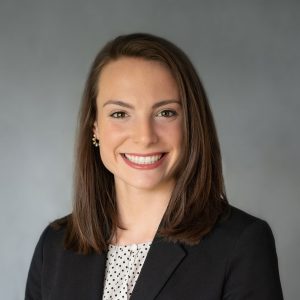Ada Pariser, MD, received this year’s David O. Hough, MD Endowed Memorial Award for Excellence in Family Medicine. The David O. Hough, MD, Scholarship is awarded annually to a graduating medical student who has been chosen as the outstanding fourth-year student planning to enter a family medicine residency program upon graduation. Below is Dr. Pariser’s award essay.
“Despite the youth of my medical career I have come to observe the family physician to be a wearer of many hats. They are friends and teachers; keen observers and skillful detectives; caregivers and advocates. Amidst the ever changing roles it is the spirit of the healer that guides the family physician in their tireless pursuit of healthier patients and stronger communities.
In September 2021, in the town of Valdez, AK, a patient presented with a large abscess on his wrist. He required IV antibiotics, but refused hospitalization. He worked as a house painter in a place where few days of the year provided a climate suitable for his job. The snow had begun to fall on the mountains, signaling the impending end of his work season. He had no time for hospitalization, much less the financial stability to pay for a hospital stay without the continued income. The town was small with a likelihood of running into him each day. We made a deal. We would meet him at the hospital every twelve hours where we would repack his wound and the nurses would infuse antibiotics. In the days that followed we laughed about matching the color of his bandage to the color of the paint that would be covering his clothes after work. It wasn’t the textbook answer on how to manage the case, but it was the realistic answer and was certainly better than no treatment at all. The spirit of the healer is creative, adaptive, and open-minded. The spirit of the healer is not bound by what is typical or mundane.

During the spring I had the opportunity to see a 19 year old patient for a health maintenance exam. She seemed very healthy; high achieving in school and very active in her free time. It was in a brief moment of talking with her about female health screenings that would start in a couple years that she made a comment which gave me pause. “I have a sensitive question,” I said. I asked if she had ever been sexually assaulted. “What is sexual assault? What would that look like?” she responded. I buried my sense of frustration that we live in a system in which a 19 year old girl hasn’t been given open-minded lessons on consent and proceeded to rephrase my questioning until I saw her eyes change shape and she proceeded to tell me in vivid detail about being raped. I sat in silence with an open posture as I let the walls of the room absorb the impact of her words. I watched closely as she simultaneously recounted the assault and recognized it as assault. There was no perfect pill or magic eraser to undo her past; just the tenderness and insightfulness of the spirit of the healer to guide my way.
In May of 2019, as the development of Healthy People 2030 was nearing its completion, I sat in a conference hall in Atlanta, GA at the National Rural Health Association conference. A discussion was being led by a senior CDC official involved in the development of the document, the significance of which lies in its power to inform the wording of federal healthcare legislation for the next decade. “Rural will not be labeled as a health disparate group in this document,” he said, “because we haven’t received enough data to suggest that it should be.” I don’t remember raising my hand, but after a moment I was holding a microphone. “I think the information you say you need is available to you through the Federal Office of Rural Health Policy,” I stated, mouth dry from the hundreds of faces glaring at me. He laughed and retorted “ah, so you want someone else to do the work.” Matter of factly I answered “no, the FORHP is part of HHS, whom you partner with in the development of this document.” He ended the meeting at that point and the next time I heard his voice was two weeks later on an NRHA conference call where he was proposing a CDC rural task force. The spirit of the healer is tenacious, advocating broadly for the promotion of wellbeing in their community.
Despite the many roles that I have witnessed my mentors in family medicine shoulder, and which I will likely shoulder, the spirit of the healer provides an anchor, keeping my eye on the patient and the community. With this spirit as my guide I hope to navigate the challenges and celebrate the joys that are so intricately weaved into the practice of family medicine.”



